儿童英语小故事带翻译-鹬蚌相争,渔翁得利
- 格式:docx
- 大小:37.58 KB
- 文档页数:2

鹬蚌相争渔翁得利的故事(最新版)编制人:__________________审核人:__________________审批人:__________________编制单位:__________________编制时间:____年____月____日序言下载提示:该文档是本店铺精心编制而成的,希望大家下载后,能够帮助大家解决实际问题。
文档下载后可定制修改,请根据实际需要进行调整和使用,谢谢!并且,本店铺为大家提供各种类型的经典范文,如散文随笔、观后感、故事大全、总结报告、工作计划、致辞讲话、心得体会、合同协议、条据书信、演讲稿大全、办公文秘、其他范文等等,想了解不同范文格式和写法,敬请关注!Download tips: This document is carefully compiled by this editor.I hope that after you download it, it can help you solve practical problems. The document can be customized and modified after downloading, please adjust and use it according to actual needs, thank you!In addition, this shop provides you with various types of classic model essays, such as prose essays, afterthoughts, stories, summary reports, work plans, speeches, experience, contract agreements, letter letters, speech drafts, office secretaries , Other sample essays, etc. If you want to know the format and writing of different sample essays, stay tuned!鹬蚌相争渔翁得利的故事“鹬蚌相争”是战国时谋士苏代游说赵惠王时所讲的一则寓言故事。
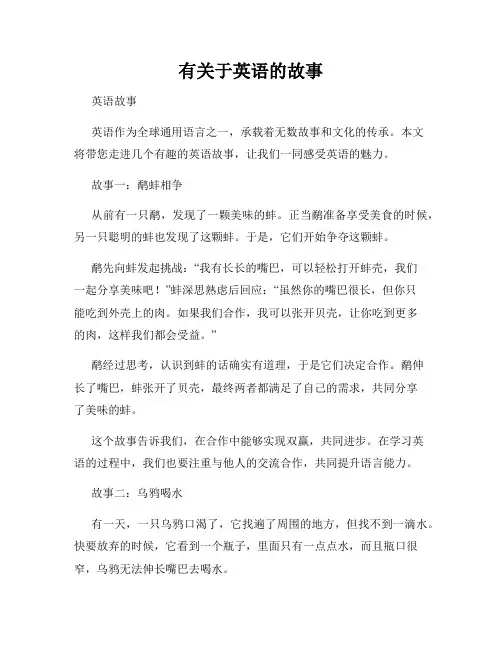
有关于英语的故事英语故事英语作为全球通用语言之一,承载着无数故事和文化的传承。
本文将带您走进几个有趣的英语故事,让我们一同感受英语的魅力。
故事一:鹬蚌相争从前有一只鹬,发现了一颗美味的蚌。
正当鹬准备享受美食的时候,另一只聪明的蚌也发现了这颗蚌。
于是,它们开始争夺这颗蚌。
鹬先向蚌发起挑战:“我有长长的嘴巴,可以轻松打开蚌壳,我们一起分享美味吧!”蚌深思熟虑后回应:“虽然你的嘴巴很长,但你只能吃到外壳上的肉。
如果我们合作,我可以张开贝壳,让你吃到更多的肉,这样我们都会受益。
”鹬经过思考,认识到蚌的话确实有道理,于是它们决定合作。
鹬伸长了嘴巴,蚌张开了贝壳,最终两者都满足了自己的需求,共同分享了美味的蚌。
这个故事告诉我们,在合作中能够实现双赢,共同进步。
在学习英语的过程中,我们也要注重与他人的交流合作,共同提升语言能力。
故事二:乌鸦喝水有一天,一只乌鸦口渴了,它找遍了周围的地方,但找不到一滴水。
快要放弃的时候,它看到一个瓶子,里面只有一点点水,而且瓶口很窄,乌鸦无法伸长嘴巴去喝水。
乌鸦聪明地想到了一个办法。
它找来了一块小石头,将其投入瓶子中,水位随之上升。
乌鸦再次尝试用嘴巴喝水,这一次,它成功地品尝到了清凉的水。
这个故事告诉我们,面对困难时,应该借助自己的智慧寻找解决办法。
学习英语也是如此,遇到难题时,我们应该尝试不同的学习方式,寻找最适合自己的方法。
故事三:渔夫和金鱼渔夫在湖边钓鱼时,钓起了一条金鱼。
金鱼恳求渔夫放它回去,并答应为渔夫实现三个愿望作为回报。
渔夫第一个愿望是,希望他的木屋变成一座豪华的别墅。
金鱼立即实现了他的愿望,渔夫惊喜不已。
然而,他的贪婪使他产生了更多的欲望。
渔夫第二个愿望是,希望他拥有无尽的财富。
金鱼不得不再次满足他的愿望。
然而,渔夫仍然感到不满足。
渔夫第三个愿望是,他希望成为全世界最有权势的人。
金鱼告诉他,过度的欲望将会有后果,并警告他三思而后行。
但是,渔夫没有听从金鱼的忠告,他执意要求金鱼实现他的愿望。
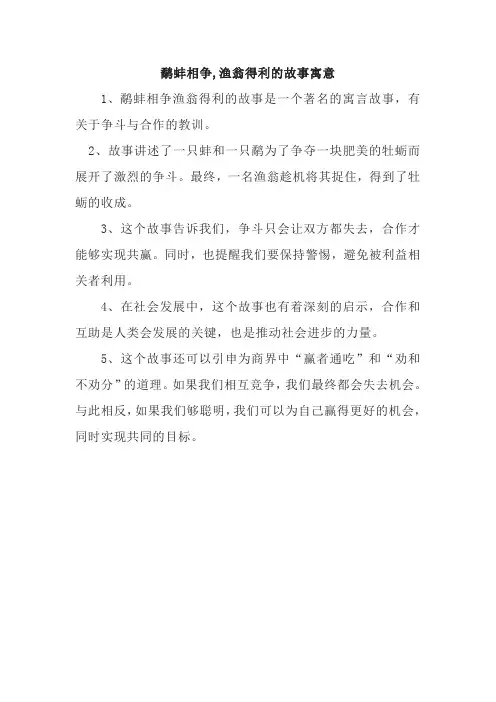
鹬蚌相争,渔翁得利的故事寓意
1、鹬蚌相争渔翁得利的故事是一个著名的寓言故事,有关于争斗与合作的教训。
2、故事讲述了一只蚌和一只鹬为了争夺一块肥美的牡蛎而展开了激烈的争斗。
最终,一名渔翁趁机将其捉住,得到了牡蛎的收成。
3、这个故事告诉我们,争斗只会让双方都失去,合作才能够实现共赢。
同时,也提醒我们要保持警惕,避免被利益相关者利用。
4、在社会发展中,这个故事也有着深刻的启示,合作和互助是人类会发展的关键,也是推动社会进步的力量。
5、这个故事还可以引申为商界中“赢者通吃”和“劝和不劝分”的道理。
如果我们相互竞争,我们最终都会失去机会。
与此相反,如果我们够聪明,我们可以为自己赢得更好的机会,同时实现共同的目标。
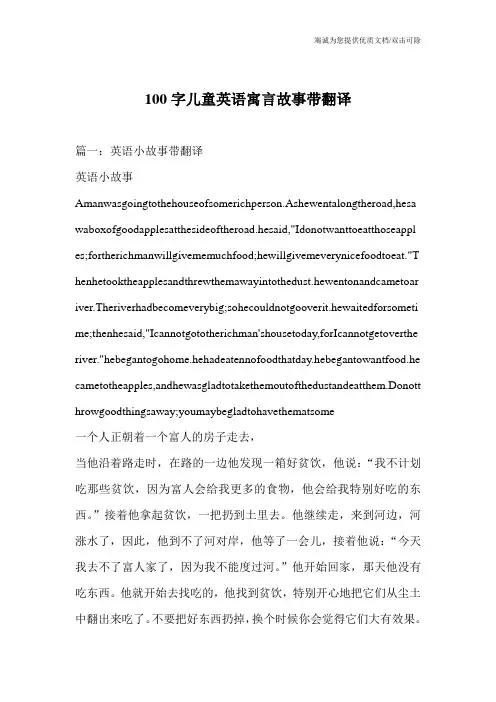
100字儿童英语寓言故事带翻译篇一:英语小故事带翻译英语小故事Amanwasgoingtothehouseofsomerichperson.Ashewentalongtheroad,hesa waboxofgoodapplesatthesideoftheroad.hesaid,"Idonotwanttoeatthoseappl es;fortherichmanwillgivememuchfood;hewillgivemeverynicefoodtoeat."T henhetooktheapplesandthrewthemawayintothedust.hewentonandcametoar iver.Theriverhadbecomeverybig;sohecouldnotgooverit.hewaitedforsometi me;thenhesaid,"Icannotgototherichman'shousetoday,forIcannotgetoverthe river."hebegantogohome.hehadeatennofoodthatday.hebegantowantfood.he cametotheapples,andhewasgladtotakethemoutofthedustandeatthem.Donott hrowgoodthingsaway;youmaybegladtohavethematsome一个人正朝着一个富人的房子走去,当他沿着路走时,在路的一边他发现一箱好贫饮,他说:“我不计划吃那些贫饮,因为富人会给我更多的食物,他会给我特别好吃的东西。
”接着他拿起贫饮,一把扔到土里去。
他继续走,来到河边,河涨水了,因此,他到不了河对岸,他等了一会儿,接着他说:“今天我去不了富人家了,因为我不能度过河。
”他开始回家,那天他没有吃东西。
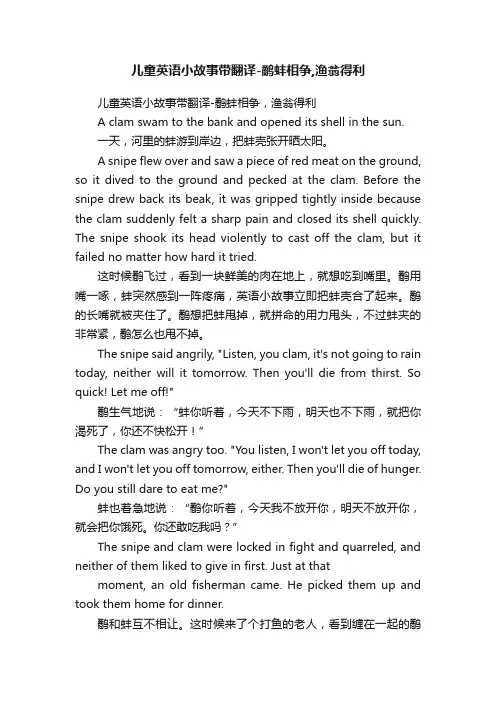
儿童英语小故事带翻译-鹬蚌相争,渔翁得利儿童英语小故事带翻译-鹬蚌相争,渔翁得利A clam swam to the bank and opened its shell in the sun.一天,河里的蚌游到岸边,把蚌壳张开晒太阳。
A snipe flew over and saw a piece of red meat on the ground, so it dived to the ground and pecked at the clam. Before the snipe drew back its beak, it was gripped tightly inside because the clam suddenly felt a sharp pain and closed its shell quickly. The snipe shook its head violently to cast off the clam, but it failed no matter how hard it tried.这时候鹬飞过,看到一块鲜美的肉在地上,就想吃到嘴里。
鹬用嘴一啄,蚌突然感到一阵疼痛,英语小故事立即把蚌壳合了起来。
鹬的长嘴就被夹住了。
鹬想把蚌甩掉,就拼命的用力甩头,不过蚌夹的非常紧,鹬怎么也甩不掉。
The snipe said angrily, "Listen, you clam, it's not going to rain today, neither will it tomorrow. Then you'll die from thirst. So quick! Let me off!"鹬生气地说:“蚌你听着,今天不下雨,明天也不下雨,就把你渴死了,你还不快松开!”The clam was angry too. "You listen, I won't let you off today, and I won't let you off tomorrow, either. Then you'll die of hunger. Do you still dare to eat me?"蚌也着急地说:“鹬你听着,今天我不放开你,明天不放开你,就会把你饿死。
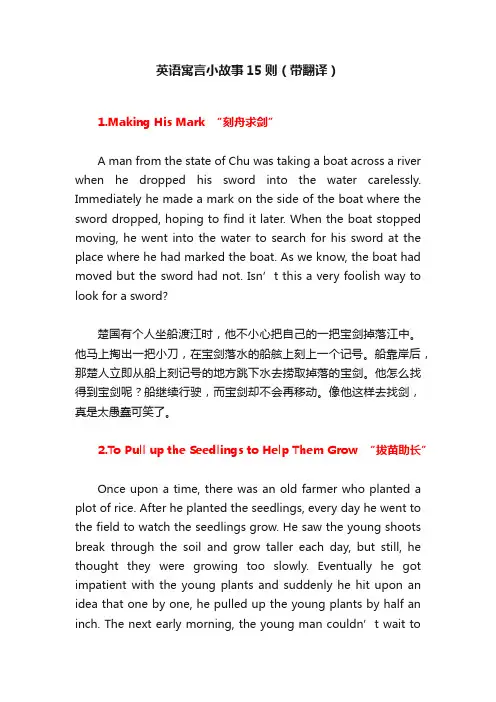
英语寓言小故事15则(带翻译)1.Making His Mark “刻舟求剑”A man from the state of Chu was taking a boat across a river when he dropped his sword into the water carelessly. Immediately he made a mark on the side of the boat where the sword dropped, hoping to find it later. When the boat stopped moving, he went into the water to search for his sword at the place where he had marked the boat. As we know, the boat had moved but the sword had not. Isn’t th is a very foolish way to look for a sword?楚国有个人坐船渡江时,他不小心把自己的一把宝剑掉落江中。
他马上掏出一把小刀,在宝剑落水的船舷上刻上一个记号。
船靠岸后,那楚人立即从船上刻记号的地方跳下水去捞取掉落的宝剑。
他怎么找得到宝剑呢?船继续行驶,而宝剑却不会再移动。
像他这样去找剑,真是太愚蠢可笑了。
2.To Pull up the Seedlings to Help Them Grow “拔苗助长”Once upon a time, there was an old farmer who planted a plot of rice. After he planted the seedlings, every day he went to the field to watch the seedlings grow. He saw the young shoots break through the soil and grow taller each day, but still, he thought they were growing too slowly. Eventually he got impatient with the young plants and suddenly he hit upon an idea that one by one, he pulled up the young plants by half an inch. The next early morning, the young man couldn’t wait tocheck his “achievement”, but he was heart-broken to see all the pulled-up young plants dying.从前,有个农夫,种了稻苗(seedlings)后,便希望能早早收成。

四年级英语寓言小故事带翻译英语寓言故事之一:Story 1Three Good FriendsOne day, a monkey rides his bike near the river. This time he sees a lion under a tree. The lion runs at him. He is afraid and falls into the river. He can’t swim. He shouts. The rabbit hears him. He jumps into the river. The rabbit swims to the monkey,but he can’t help him. Luckily, an elephant comes along. He is very strong. He helps the rabbit and monkey. Three friends are very happy. They go to the elephant’s home. Then, three of them become good friends.故事一三个好朋友一天,一只猴子在河边骑车。
这时他看见树下有一只狮子,狮子向他跑来。
他非常的害怕,掉进河里。
他不会游泳,大叫起来。
兔子听见了,跳进水里,但他却没有办法救猴子。
幸运的'是,一只大象过来了。
大象非常强壮,救出了兔子和猴子。
他们来到大象的家,在那里吃了一顿大餐。
从此他们成了好朋友。
英语寓言故事之二:Story 2A Good BoyLittle Robert asked his mother for two cents. “What did you do with the money I gave you yesterday?”“I gave it to a poor old woman,” h e answered.“You‘re a good boy,” said the mother proudly. “Here are two cents more. But why are you so interested in the old woman?”“She is the one who sells the candy.”故事二好孩子小罗伯特向妈妈要两分钱。
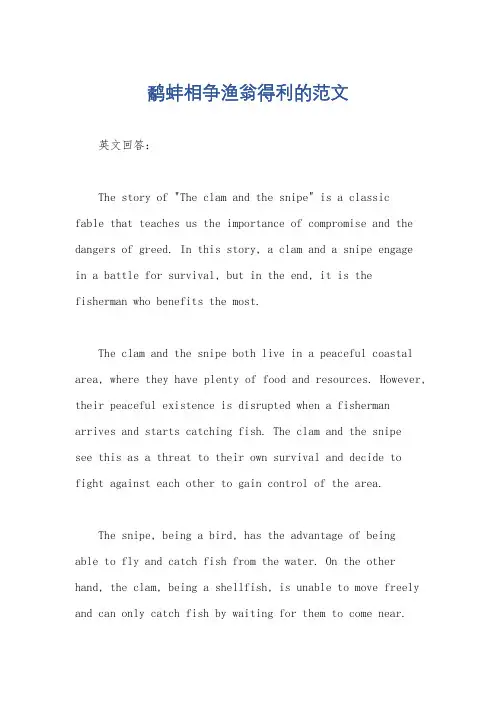
鹬蚌相争渔翁得利的范文英文回答:The story of "The clam and the snipe" is a classicfable that teaches us the importance of compromise and the dangers of greed. In this story, a clam and a snipe engagein a battle for survival, but in the end, it is the fisherman who benefits the most.The clam and the snipe both live in a peaceful coastal area, where they have plenty of food and resources. However, their peaceful existence is disrupted when a fisherman arrives and starts catching fish. The clam and the snipesee this as a threat to their own survival and decide to fight against each other to gain control of the area.The snipe, being a bird, has the advantage of beingable to fly and catch fish from the water. On the other hand, the clam, being a shellfish, is unable to move freely and can only catch fish by waiting for them to come near.Despite their different abilities, both the clam and the snipe are determined to win the battle.As the clam and the snipe fight, the fisherman quietly observes their actions. He realizes that their fight is creating a disturbance in the water, causing the fish to scatter and making it easier for him to catch them. The fisherman sees an opportunity and quickly casts his net, catching a large number of fish.In the end, the clam and the snipe realize their mistake. They were so focused on defeating each other that they didn't realize they were actually helping the fisherman. They both lose the battle and the fisherman gains the most from their conflict.This story teaches us the importance of cooperation and compromise. If the clam and the snipe had worked together instead of fighting, they could have easily scared away the fisherman and protected their resources. However, their greed and desire to be the sole beneficiaries led to their downfall.中文回答:《鹬蚌相争渔翁得利》这个寓言故事告诉我们妥协的重要性和贪婪的危害。
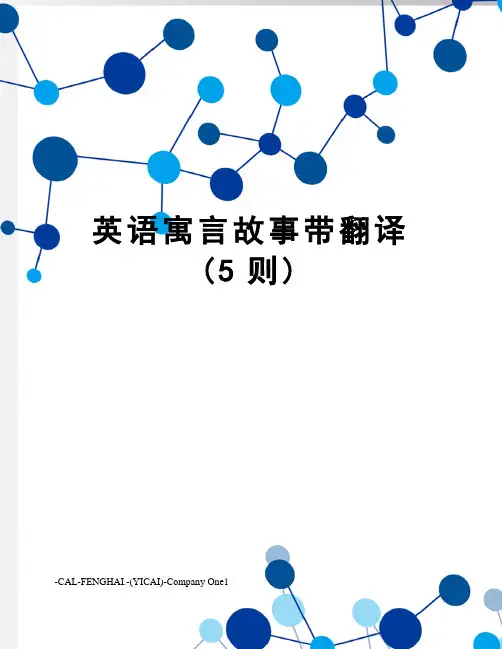
英语寓言故事带翻译(5则)-CAL-FENGHAI.-(YICAI)-Company One1The Father and His SonFather had a family of sons who were perpetually quarrelling among themselves. When he failed to heal their disputes by his exhortations, he determined to give them a practical illustration of the evils of disunion; and for this purpose he one day told them to bring him a bundle of sticks. When they had done so, he placed the faggot into the hands of each of them in succession, and ordered them to break it in pieces. They each tried with all their strength, and were not able to do it.He next unclosed the faggot, and took the sticks separately, one by one, and again put them into their hands, on which they broke them easily. He then addressed them in these words: "My sons, if you are of one mind, and unite to assist each other, you will be as this faggot, uninjured by all the attempts of your enemies; but if you are divided among yourselves, you will be broken aseasily as these sticks."父亲和孩子们一位父亲有几个孩子,这些孩子时常发生口角。
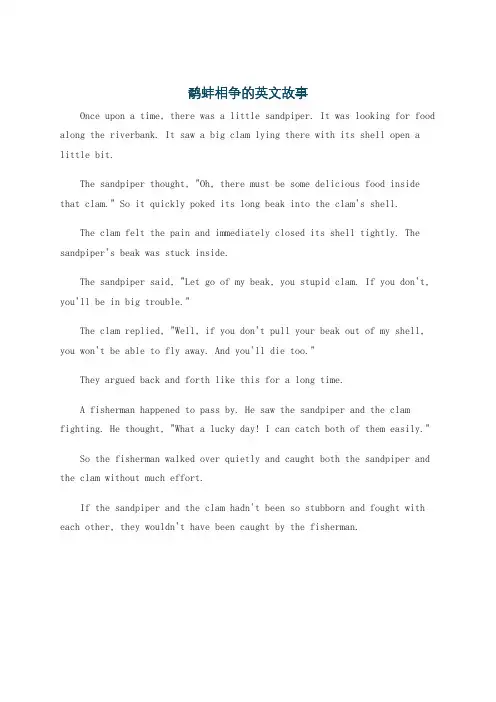
鹬蚌相争的英文故事Once upon a time, there was a little sandpiper. It was looking for food along the riverbank. It saw a big clam lying there with its shell open a little bit.The sandpiper thought, "Oh, there must be some delicious food inside that clam." So it quickly poked its long beak into the clam's shell.The clam felt the pain and immediately closed its shell tightly. The sandpiper's beak was stuck inside.The sandpiper said, "Let go of my beak, you stupid clam. If you don't, you'll be in big trouble."The clam replied, "Well, if you don't pull your beak out of my shell, you won't be able to fly away. And you'll die too."They argued back and forth like this for a long time.A fisherman happened to pass by. He saw the sandpiper and the clam fighting. He thought, "What a lucky day! I can catch both of them easily."So the fisherman walked over quietly and caught both the sandpiper and the clam without much effort.If the sandpiper and the clam hadn't been so stubborn and fought with each other, they wouldn't have been caught by the fisherman.。
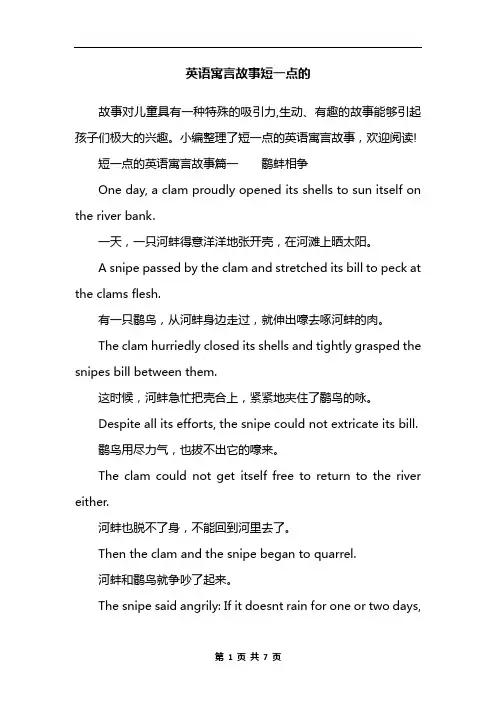
英语寓言故事短一点的故事对儿童具有一种特殊的吸引力,生动、有趣的故事能够引起孩子们极大的兴趣。
小编整理了短一点的英语寓言故事,欢迎阅读!短一点的英语寓言故事篇一鹬蚌相争One day, a clam proudly opened its shells to sun itself on the river bank.一天,一只河蚌得意洋洋地张开壳,在河滩上晒太阳。
A snipe passed by the clam and stretched its bill to peck at the clams flesh.有一只鹬鸟,从河蚌身边走过,就伸出嚎去啄河蚌的肉。
The clam hurriedly closed its shells and tightly grasped the snipes bill between them.这时候,河蚌急忙把壳合上,紧紧地夹住了鹬鸟的咏。
Despite all its efforts, the snipe could not extricate its bill.鹬鸟用尽力气,也拔不出它的嚎来。
The clam could not get itself free to return to the river either.河蚌也脱不了身,不能回到河里去了。
Then the clam and the snipe began to quarrel.河蚌和鹬鸟就争吵了起来。
The snipe said angrily: If it doesnt rain for one or two days,there will be no water.鹬鸟气呼呼地说:一天不下雨,两天不下雨,没有了水。
And you cant return to the river, then surely you will die anyway.你回不了河,总是要死的。
The clam also said angrily: If I dont let go of you for one or two days, you wont be able topull out your bill. Dont hope that you can live.鹬河蚌也气呼呼地说:一天不放你,两天不放你,你的咏拔不出来,也别想活。
儿童英语寓言故事附中文翻译小时候经常看到一些寓言故事,比如说渔夫和鱼的故事,我们看过之后本以为自己会忘记,但其实这个故事一直在我们脑海里。
今天为大家奉上儿童英语寓言故事,时间难得,何不深入了解一下让自己的收获更多呢?儿童英语寓言故事(一)The Frog PrinceIn olden times when wishing still helped one, there lived a king whose daughters were all beautiful, but the youngest was so beautiful that the sun itself, which has seen so much, was astonished whenever it shone in her face. Close by the king's castle lay a great dark forest, and under an old lime-tree in the forest was a well, and when the day was very warm, the king's child went out into the forest and sat down by the side of the cool fountain, and when she was bored she took a golden ball, and threw it up on high and caught it, and this ball was her favorite play thing.Now it so happened that on one occasion the princess's golden ball did not fall into the little hand which she was holding up for it, but on to the ground beyond, and rolled straight into the water. The king's daughter followed it with her eyes, but it vanished, and the well was deep, so deep that the bottom could not be seen. At this she began to cry, and cried louder and louder, and could not be comforted. And as she thus lamented someone said to her, "What ails you, king's daughter? You weep so that even a stone would show pity."She looked round to the side from whence the voice came, and saw a frog stretching forth its big, ugly head from the water. "Ah, old water-splashier, is it you," she said, "I am weeping for mygolden ball, which has fallen into the well." "Be quiet, and do not weep," answered the frog, "I can help you, but what will you give me if I bring your play thing up again?" "Whatever you will have, dear frog," said she, "My clothes, my pearls and jewels, and even the golden crown which I am wearing." The frog answered, "I do not care for your clothes, your pearls and jewels, nor for your golden crown, but if you will love me and let me be your companion and play-fellow, and sit by you at your little table, and eat off your little golden plate, and drink out of your little cup, and sleep in your little bed - if you will promise me this I will go down below, and bring you your golden ball up again.""Oh yes," said she, "I promise you all you wish, if you will but bring me my ball back again." But she thought, "How the silly frog does talk. All he does is to sit in the water with the other frogs, and croak. He can be no companion to any human being."But the frog when he had received this promise, put his head into the water and sank down; and in a short while came swimming up again with the ball in his mouth, and threw it on the grass. The king's daughter was delighted to see her pretty play thing once more, and picked it up, and ran away with it. "Wait, wait," said the frog. "Take me with you. I can't run as you can." But what did it avail him to scream his croak, croak, after her, as loudly as he could. She did not listen to it, but ran home and soon forgot the poor frog, who was forced to go back into his well again.The next day when she had seated herself at table with the king and all the courtiers, and was eating from her little golden plate, something came creeping splish splash, splish splash, up the marble staircase, and when it had got to the top, it knocked at the door and cried, "Princess, youngest princess, open thedoor for me." She ran to see who was outside, but when she opened the door, there sat the frog in front of it. Then she slammed the door to, in great haste, sat down to dinner again, and was quite frightened. The king saw plainly that her heart was beating violently, and said, "My child, what are you so afraid of? Is there perchance a giant outside who wants to carry you away?""Ah, no," replied she. "It is no giant but a disgusting frog.""What does a frog want with you?""Ah, dear father, yesterday as I was in the forest sitting by the well, playing, my golden ball fell into the water. And because I cried so, the frog brought it out again for me, and because he so insisted, I promised him he should be my companion, but I never thought he would be able to come out of his water. And now he is outside there, and wants to come in to me."In the meantime it knocked a second time, and cried, "Princess, youngest princess, open the door for me, do you not know what you said to me yesterday by the cool waters of the well. Princess, youngest princess, open the door for me."Then said the king, "That which you have promised must you perform. Go and let him in." She went and opened the door, and the frog hopped in and followed her, step by step, to her chair. There he sat and cried, "Lift me up beside you." She delayed, until at last the king commanded her to do it. Once the frog was on the chair he wanted to be on the table, and when he was on the table he said, "Now, push your little golden plate nearer to me that we may eat together." She did this, but it was easy to see that she did not do it willingly. The frog enjoyed what he ate, but almost every mouthful she took choked her. At length he said, "I have eaten and am satisfied, now I am tired, carry me into your little room and make your little silken bed ready, and we will bothlie down and go to sleep."The king's daughter began to cry, for she was afraid of the cold frog which she did not like to touch, and which was now to sleep in her pretty, clean little bed. But the king grew angry and said, "He who helped you when you were in trouble ought not afterwards to be despised by you." So she took hold of the frog with two fingers, carried him upstairs, and put him in a corner, but when she was in bed he crept to her and said, "I am tired, I want to sleep as well as you, lift me up or I will tell your father." At this she was terribly angry, and took him up and threw him with all her might against the wall. "Now, will you be quiet, odious frog," said she. But when he fell down he was no frog but a king's son with kind and beautiful eyes. He by her father's will was now her dear companion and husband. Then he told her how he had been bewitched by a wicked witch, and how no one could have delivered him from the well but herself, and that tomorrow they would go together into his kingdom.Then they went to sleep, and the next morning when the sun awoke them, a carriage came driving up with eight white horses, which had white ostrich feathers on their heads, and were harnessed with golden chains, and behind stood the young king's servant Faithful Henry.Faithful Henry had been so unhappy when his master was changed into a frog, that he had caused three iron bands to be laid round his heart, lest it should burst with grief and sadness. The carriage was to conduct the young king into his kingdom. Faithful Henry helped them both in, and placed himself behind again, and was full of joy because of this deliverance. And when they had driven a part of the way the king's son heard a cracking behind him as if something had broken. So he turned round andcried, "Henry, the carriage is breaking.""No, master, it is not the carriage. It is a band from my heart, which was put there in my great pain when you were a frog and imprisoned in the well." Again and once again while they were on their way something cracked, and each time the king's son thought the carriage was breaking, but it was only the bands which were springing from the heart of Faithful Henry because his master was set free and was happy.在遥远的古代,人们心中的美好愿望往往能够变成现实。
鹬蚌相争,渔翁得利: two dogs fight for a bone, and玉不琢,不成器: A piece of jade unless cut forms no article of vertu. / An uncut gem goes not sparkle. / The finest diamond must be cut. / Unpolished pearls never shine.十年树木,百年树人: It takes ten years to grow a tree and a hundred years to bring up a generation of good men. / It takes three generations to makea gentleman.学无止境: knowledge is infinite /progress sometimes uses a comma, but never a full stop.此地无银三百两: never try to prove what nobody doubts.严师出高徒: Good pupils are to be brought up by strict teachers. / It is the bridle and spur that makes a good horse.得不偿失: give a lark to catch a kite.对症下药: a disease known is half the cure.君子之交淡如水: a hedge between keeps friendship green.化干戈为玉帛: bury the hatchet.家和万事兴: he is happiest, be he king or peasant, who finds peace in his home.江山易改,本性难移: the leopard cannot change its spots.留得青山在,不怕没柴烧: where there is life, there is hope.狡兔三窟: the mouse that has but one hole is quickly taken.举一反三: half a tale is enough for a wise man.当局者迷,旁观者清: outsiders see more than insiders. / standers-by see more than gamesters.世上无难事,只怕有心人: dogged does it.笨鸟先飞: a slow sparrow should make an early start. /a lame traveler should get out betimes.冷暖自知: every man is best known to himself.有情人终成眷属: every jack has jill.宁为玉碎不为瓦全: better death than dishonor.情人眼里出西施: if jack is in love, he is no judge of jill’s beauty.拳不离手,曲不离口: no day without a line.吃一堑,长一智: by falling we learn to go safely.塞翁失马: no great loss without some small gain.天无绝人之路: god tempers the wind to the shorn lamb.仁者见仁,智者见智: the donkey means one thing, and the driver another. / the benevolent see benevolence and the wise see wisdom.师傅领进门,修行在个人: no man is his craft’s master the first day.玉不琢,不成器:A piece of jade unless cut forms no article of vertu. An uncut gem goes not sparkle. The finest diamond must be cut. Unpolished pearls never shine. 十年树木,百年树人:It takes ten years to grow a tree and a hundred years to bring up a generation of good men. It takes three generations to make a gentleman.Each bird loves to hear himself sing. 鸟儿都爱听自己唱歌。
渔翁得利鹬蚌相争英文版Fisherman's Profit from the Struggle of the Spoonbill and the Mussel.In the ancient realm of Chinese folklore, a profound lesson is told through the tale of the "Fisherman's Profit from the Struggle of the Spoonbill and the Mussel." This fable, often shortened to just "Spoonbill and the Mussel," is a timeless reminder of the consequences of foolish rivalry and the unexpected benefits that can arise from the conflicts of others.In the story, a Spoonbill and a Mussel find themselves on the banks of a river. The river is low, and both creatures are desperate for water. As they eye the shrinking pool, their desperation turns to aggression, and soon they find themselves locked in a fierce battle. The Spoonbill, with its long, curved beak, attempts to snatch the Mussel out of the mud. The Mussel, in turn, clamps tightly onto the Spoonbill's beak, refusing to let go. Asthey struggle, both creatures become exhausted, their energy consumed by the relentless conflict.Meanwhile, a Fisherman watches the scene unfold from the shore. He sees the foolishness of the Spoonbill and the Mussel, locked in a battle that neither seems able to win. The Fisherman knows that if he waits, the struggle will only weaken both creatures further. It is then that he seizes his opportunity, stepping into the river and easily capturing both the Spoonbill and the Mussel.The moral of the story is clear: foolish rivalry can lead to unexpected losses, while those who stay apart and remain observant may reap unexpected benefits. The Spoonbill and the Mussel, caught up in their own conflicts, failed to see the danger approaching. They were so focused on defeating each other that they neglected the bigger threat lurking in the shadows.This tale is not just a simple fable for children; it carries profound wisdom for all ages. It teaches us about the importance of perspective, the folly of unnecessaryconflicts, and the value of remaining vigilant and observant in all situations.In today's world, we often find ourselves caught up in similar situations. Whether it's a rivalry at work, a dispute with a friend, or a never-ending argument on social media, we can easily lose sight of the bigger picture. We become so focused on winning the argument or achieving a temporary victory that we forget about the potential costs.Just like the Spoonbill and the Mussel, we can sometimes become so entangled in our own conflicts that we fail to see the bigger threats looming around us. It might be a missed opportunity, a broken relationship, or even a life-altering decision. By staying focused on the bigger picture and avoiding foolish rivalries, we can avoid these pitfalls and move forward with clarity and purpose.Moreover, this story teaches us about the value of remaining observant and vigilant. Just like the Fisherman who capitalized on the Spoonbill and Mussel's folly, those who are observant and ready to seize opportunities canoften reap unexpected rewards. It's about being aware of our surroundings, understanding the dynamics of the situations we find ourselves in, and being ready to act when the time is right.In conclusion, the story of the "Fisherman's Profit from the Struggle of the Spoonbill and the Mussel" is a timeless tale that carries profound wisdom for all of us. It reminds us of the folly of unnecessary rivalries, the importance of perspective, and the value of remaining observant and vigilant. By applying these lessons to our lives, we can avoid the pitfalls of foolish conflict and seize the opportunities that come our way.。
鹬蚌相争渔人得利作文英文回答:The story of "The Snipe and the Clam" is a classicfable that teaches us the importance of cooperation and the consequences of greed. In this tale, a snipe and a clam engage in a fierce battle, each refusing to back down. Meanwhile, a fisherman takes advantage of their distraction and catches both of them, benefiting from their foolishness.This fable reminds me of a common saying, "When two elephants fight, it is the grass that suffers." In this case, when the snipe and the clam fight, it is thefisherman who benefits. This story teaches us that when we are too focused on our own conflicts and fail to see the bigger picture, we can easily become victims of our own greed.The snipe and the clam's rivalry represents a common human trait – the desire to always win, even at theexpense of others. This mindset often leads to unnecessary conflicts and prevents us from achieving greater goals. In the end, both the snipe and the clam lose, while the fisherman wins. This serves as a reminder that cooperation and compromise are essential for success.中文回答:《鹬蚌相争渔人得利》这个寓言故事告诉我们合作的重要性和贪婪的后果。
鹬蚌相争渔翁得利的作文英文带翻译The Wise Observer: A Tale of Patient WaitingIn a far-off land, by a serene lake, lived a wise old fisherman known for his patience and cunning. This fisherman was not like the rest, always seeking the fastest catch or the easiest prey. Instead, he preferred to let nature take its course, knowing that the best catches often come when least expected.One sunny day, the fisherman sat by the lake, idly casting his net. Suddenly, a commotion arose from the water. A plump crab and a stately stork were locked in a furious struggle, each fighting fiercely for possession of a morsel of meat. The crab clamped onto the meat with its powerful pincers, while the stork used its beak to pull it away. The tussle was so intense that neither creature noticed the fisherman watching them with a knowing smile. As the battle raged on, the fisherman remained calm. He knew that both the crab and the stork were too focused on their rivalry to notice his presence. So, he sat patiently, waiting for the perfect moment. And when that moment came, he effortlessly reached into the water and captured both the crab and the stork in his net.The crab and the stork, still locked in combat, were taken aback when they realized their predicament. They looked at each other in surprise, realizing that their foolish rivalry had led them into the trap of the fisherman. The crab regretted its stubbornness, while the stork lamented its pride.The fisherman, however, merely shook his head and smiled. He released the crab and the stork, telling them, "Learn from your mistakes, and remember that rivalry often leads to ruin." The crab and the stork, ashamed and grateful, promised to do so.And so, the wise fisherman continued his patient wait, knowing that there would be other opportunities for him to catch his dinner. He understood that true wisdom lay in knowing when to act and when to let things unfold naturally. For him, the game was not merely about catching fish, but about understanding life's lessons and embracing its wisdom. Translation:智者观察者:耐心等待的故事在遥远的土地上,有一个宁静的湖边,住着一个以耐心和狡猾著称的老渔夫。
儿童英语小故事带翻译-鹬蚌相争,渔翁得利
A clam swam to the bank and opened its shell in the sun.
一天,河里的蚌游到岸边,把蚌壳张开晒太阳。
A snipe flew over and saw a piece of red meat on the ground, so it dived to the ground and pecked at the clam. Before the snipe drew back its beak, it was gripped tightly inside because the clam suddenly felt a sharp pain and closed its shell quickly. The snipe shook its head violently to cast off the clam, but it failed no matter how hard it tried.
这时候鹬飞过,看到一块鲜美的肉在地上,就想吃到嘴里。
鹬用嘴一啄,蚌突然感到一阵疼痛,英语小故事立即把蚌壳合了起来。
鹬的长嘴就被夹住了。
鹬想把蚌甩掉,就拼命的用力甩头,不过蚌夹的非常紧,鹬怎么也甩不掉。
The snipe said angrily, "Listen, you clam, it's not going to rain today, neither will it tomorrow. Then you'll die from thirst. So quick! Let me off!"
鹬生气地说:“蚌你听着,今天不下雨,明天也不下雨,就把你渴死了,你还不快松开!”
The clam was angry too. "You listen, I won't let you off today, and I won't let you off tomorrow, either. Then you'll die of hunger. Do you still dare to eat me?"
蚌也着急地说:“鹬你听着,今天我不放开你,明天不放开你,就会把你饿死。
你还敢吃我吗?”
The snipe and clam were locked in fight and quarreled, and neither of them liked to give in first. Just at that
moment, an old fisherman came. He picked them up and took them home for dinner.
鹬和蚌互不相让。
这时候来了个打鱼的老人,看到缠在一起的鹬和蚌,就把它们一起抓走了。
The story tells us that the third party will have an advantage fall into his lap when the other two parties are locked in combat for their own personal interests.
这个故事是说,为了私利,各不相让,会导致两败俱伤,反而会让第三者坐收渔利。